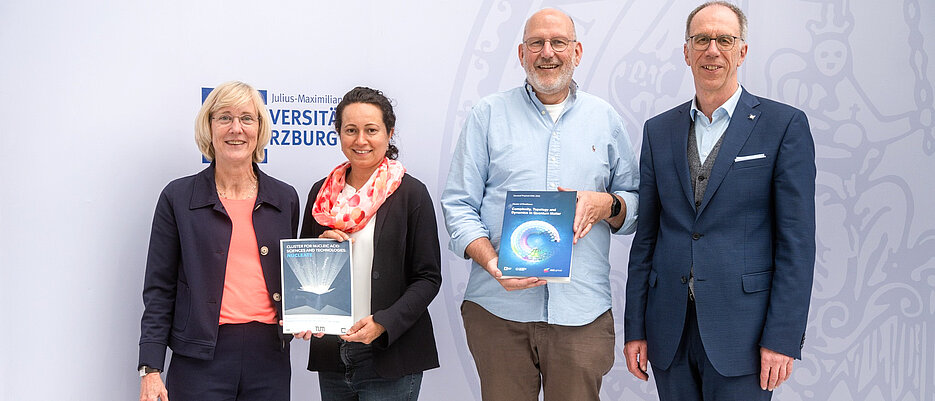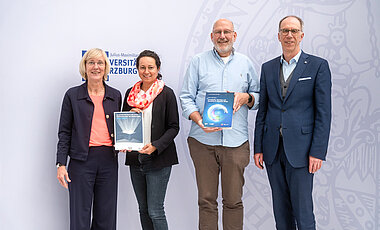Excellence Competition: Success for Top Würzburg Researchers
05/22/2025The University of Würzburg has secured funding for two Clusters of Excellence under the Excellence Strategy. This also means that it is now eligible to apply for University of Excellence status.

It is official: The University of Würzburg (JMU) has secured two Clusters of Excellence in the competition for funding under the Excellence Strategy. Launched by the German federal and state governments, the Excellence Strategy is a highly competitive funding programme designed to foster cutting-edge research. JMU was successful with its proposal for the new NUCLEATE project and a renewal proposal for the ctd.qmat Cluster of Excellence. The Clusters in the fields of nucleic acid research and quantum physics are two of the 70 projects that were selected for funding from among the 98 full proposals that were submitted in total.
‘We are very proud of this outstanding success,’ said Paul Pauli, President of the University of Würzburg. ‘This is a great day not only for our university but for the city of Würzburg as a whole. The two projects demonstrate that Würzburg is a node for excellent research and one of the top players on the international stage. This further strengthens our resolve to pursue the title of University of Excellence with full force.’
Congratulations on Würzburg's success have also come from Markus Blume, Bavaria's Science Minister, who said: ‘Chapeau and congratulations to the researchers for their outstanding success in Germany's most important research competition! This is an accolade for the entire University of Würzburg. With two successful Clusters of Excellence, the university is now in the running to become the third University of Excellence in Bavaria. One thing is clear: Würzburg wants the title. The qualification round has been successfully completed. Now it's full speed ahead in the competition for the Universities of Excellence!’
Two joint proposals successful
Consisting of members from the Faculties of Medicine, Biology and Chemistry and Pharmacy, NUCLEATE (Cluster for Nucleic Acid Sciences and Technologies) is a Cluster in the innovative field of nucleic acids. Its objective is to harness the potential of nucleic acids towards a new understanding of their role in biology and to pave the way into the field of nucleic acid medicine. In the context of NUCLEATE, the University of Würzburg will work together with the two Munich universities LMU and TUM to strengthen interdisciplinary and interinstitutional collaboration in this field.
‘NUCLEATE investigates fundamental biological principles and mechanisms of action of nucleic acids in the cell in diverse disease contexts,’ said Cynthia Sharma, designated representative for Würzburg and holder of the Chair of Molecular Infection Biology II. ‘I am very happy that our proposal for this Cluster has been successful. In NUCLEATE, our Munich colleagues and we will, for the first time, pursue a nucleic acid-centred approach and investigate both the functions and mechanisms of nucleic acids as actors in the cell and the processes that influence nucleic acids themselves. We will use our findings to develop new nucleic acid-based biotechnological and biomedical applications.’
‘Working together across disciplines at three Bavarian universities and combining our expertise in the field of nucleic acids will strengthen biomedical research in Bavaria in the long term – both nationally and internationally,’ emphasises Professor Caroline Kisker, who is coordinating the research project on the Würzburg side together with Professor Sharma and who is also a Vice-President of JMU and the holder of the Chair of Structural Biology. ‘I’m curious to see what findings the Cluster will produce and how they will advance nucleic acid-based technologies and medicine.’
ctd.qmat: insights into the world of quantum materials
The ctd.qmat – Complexity, Topology and Dynamics in Quantum Matter Cluster investigates novel quantum materials. Established in 2019, the research alliance is a joint project of the University of Würzburg and Dresden University of Technology and brings together more than 300 researchers from more than 30 countries. ctd.qmat, then known as ‘ct.qmat’, was funded under the Excellence Strategy in the last funding period already.
‘Our researchers are working on the development of materials that are essential for technologies of the future’, said Ralph Claessen, representative of the Cluster for Würzburg and head of the Chair of Experimental Physics IV. ‘The patents we have developed, including those for topological lasers and ultra-precise measurement, lay the groundwork for practical technological applications.’ Going forward, the researchers will expand their focus to include quantum dynamics, a key topic in solid state physics.
The ct.qmat Cluster of Excellence has been funded under the Excellence Strategy of the German Federal and State Governments since 2019 and back then was the only one of the 57 Clusters in Germany that was based at two universities located in two different federal states. The great successes of the Cluster, which were made possible by the close collaboration of the teams at Würzburg and at Dresden, include the development of novel topological materials such as manganese bismuth telluride and Heusler compounds. Other pioneering research is conducted by the Cluster in the fields of superconductivity and topological insulators.
Other highlights include the investigation of ‘topoelectric’ circuits, atomic monolayers as topological insulators, the creation and imaging of topological magnetic nanostructures and progress on topological lasers. And the science communication of ct.qmat is excellent, too: The Cluster has developed award-winning outreach projects such as charming Kitty Q or the QUANTube videos.
On the way towards University of Excellence status
Having secured the two Clusters of Excellence, JMU is now also eligible to apply for University of Excellence status – apart from the two Munich universities LMU and TUM (already Universities of Excellence), the University of Würzburg is the only university in Bavaria that still has a chance of winning this coveted title.
Unlike the ‘Clusters of Excellence’ funding line, the ‘Universities of Excellence’ line focuses on the university as a whole, not on individual research projects. The funding line is designed to develop whole German universities into top players on the international research stage. In the last period, ten Universities of Excellence and one University Alliance received funding from the federal and state governments. In total only up to five will be added nationwide in the next funding period.
‘The competition will be extremely tough,’ said JMU President Paul Pauli. ‘But our university is benefiting already – whatever the outcome may be. We are currently reviewing existing processes across portfolios and issues and putting ourselves in an even better position strategically.’ For many months now, the preparation of JMU’s application for University of Excellence status has been in full swing. The application itself will have to be submitted to the German Science and Humanities Council (Wissenschaftsrat, WR) by mid-November 2025, while a letter of intent will be due in June 2025 already.
About the Excellence Competition
The Excellence Strategy is a programme by the German federal and state governments to promote the international competitiveness of German universities. Currently, 57 Clusters of Excellence, including ct.qmat, are being funded within this programme with an annual funding amount of €385 million. In the second funding period, which will begin in 2026, the number of Clusters of Excellence will rise to 70 and the annual funding amount to €539 million.
The deadline for new draft proposals for Clusters of Excellence was 31 May 2023. A total of 143 drafts from 59 universities were submitted to the DFG. A panel of international experts reviewed these and, in February 2024, selected 41 of them to proceed to the full proposal stage (including NUCLEATE). From among these and an additional 57 renewal proposals for Clusters hat were already being funded (including ctd.qmat), 70 projects were selected by the panel on 22 May 2025 as Clusters of Excellence for the next funding period.
More information about the Excellence Strategy can be found on the JMU website.
Contact
Dr. Esther Knemeyer, Press Officer of the University of Würzburg, phone: + 49 931 31-86002, esther.knemeyer@uni-wuerzburg.de
Additional images







